Five business books for you in April 2022
There's some interesting books from the world of business and beyond, either out recently or forthcoming, that are worth getting your hands on in April 2022.
Here's five that we'd recommend.
- Good Comes First: How Today's Leaders Create an Uncompromising Company Culture That Doesn't Suck
by S. Chris Edmonds Mark S. Babbitt - Race for Tomorrow: Survival, Innovation and Profit on the Front Lines of the Climate Crisis
by Simon Mundy - Futureproof: 9 Rules for Humans in the Age of Automation
by Kevin Roose - Digital Body Language: How to Build Trust and Connection, No Matter the Distance
by Erica Dhawan - A World Without Email: Reimagining Work in an Age of Communication Overload
by Cal Newport
Good Comes First: How Today's Leaders Create an Uncompromising Company Culture That Doesn't Suck
by S. Chris Edmonds Mark S. Babbitt
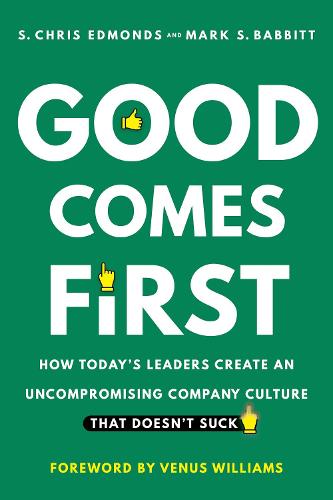
For decades, talented people have tolerated old-school leaders who put results before respect, toxic company cultures, and workplaces that suck. But those days are over, and if leaders want to attract and retain the best employees-while improving productivity, customer service, employee satisfaction, and profits-it's time for them to create work cultures where good comes first.
The problem is that because the corporate world has too often been driven primarily by results, we seldom ask leaders to change their work cultures. Even if we did, most leaders don't know how. This book provides the actionable inspiration and practical direction needed to make that change happen.
In Good Comes First , S. Chris Edmonds and Mark S. Babbitt go beyond theoretical advice, using their combined 50 years of experience to present proven strategies for creating purposeful, positive and productive work cultures. Cultures where good comes first for employees, customers, leaders, and stakeholders-and where improved business outcomes quickly follow.
In these pages, readers will learn to:
- Appreciate why a good comes first culture is a business imperative - especially for younger generations.
- Distance yourself from the competition that maintains its undefined work culture (one that most likely sucks).
- Identify what "good" means for your company in today's business climate - and in the future of work.
- Define your uncompromising work culture as you build a foundation of respect AND results.
- Formalise your team's servant purpose so that everyone understands how what your team does improves lives and communities.
- Specify respectful behaviours , so your desired values are observable, tangible, and measurable.
- Align your entire organisation to your desired work culture - where good comes first every day.
- Assess the quality of your current work culture by measuring and monitoring how well your leaders and your executive team demonstrate your servant purpose, valued behaviours, strategies, and goals.
- Hold everyone accountable for both respect and results through modelling, celebrating, measuring, coaching, and mentoring leaders and team members.
- Implement real, needed change - and quit "thinking" and "talking" about change (but never really get change started).
- Become a change champion while creating a lasting legacy as a business leader.
- Build a team of good people doing good work in a good company.
What's more, Good Comes First shows you where potential barriers to success hide-and how to push through them-and illuminates the moments when you'll feel the most satisfaction and gain the most traction.
After reading this book, you will see that when done right, change is not only possible-it's practical, powerful, and profitable. And you will realise that you are the right person, at the right time, to make that change happen.
Buy it:
Printed: Bookshop.org | Hive
eBook: Kindle | Kobo | eBooks.com
Audiobook: Audible | Kobo
(All links are unaffiliated.)
Race for Tomorrow: Survival, Innovation and Profit on the Front Lines of the Climate Crisis
by Simon Mundy
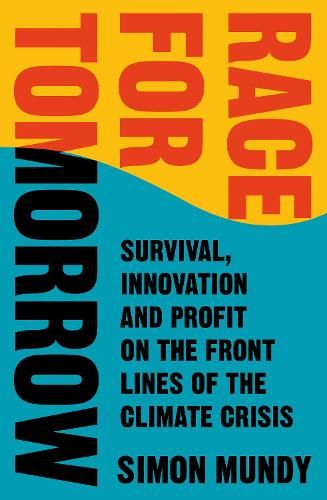
In this extraordinary journey through twenty-six countries, Simon Mundy meets the people on the front lines of the climate crisis, showing how the struggle to respond is already reshaping the modern world – shattering communities, shaking up global business, and propelling a groundbreaking wave of cutting-edge innovation.
- HOW is China’s green energy push driving a hazardous mining rush in Congo
- WHY is a maverick scientist building a home for engineered mammoths in northeast Siberia?
- CAN an Israeli fake meat startup make a fortune while helping to save the Amazon?
- WILL Greenland’s melting sea ice put its people at the centre of a global power struggle?
- WHO are the entrepreneurs chasing breakthroughs in fusion power, electric cars, and technology to suck carbon from the atmosphere?
As the impacts of climate change cascade across the planet and the global economy, who is battling to survive the worst impacts – and who is chasing the most lucrative rewards?
Telling unforgettable human stories from six continents, this is an account of disaster, of promise, of frantic adaptation and relentless innovation, of hope, of survival, and of the forces that will define our future.
Buy it:
Printed: Bookshop.org | Hive
eBook: Kindle | Kobo | eBooks.com
Audiobook: Audible | Kobo
(All links are unaffiliated.)
Futureproof: 9 Rules for Humans in the Age of Automation
by Kevin Roose
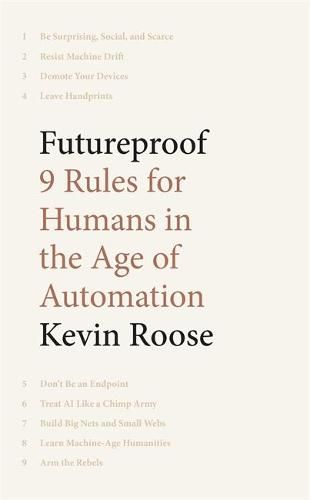
The machines are here. After decades of sci-fi fantasies and hype, artificial intelligence has leapt out of research labs and Silicon Valley engineering departments and into the centre of our lives. Algorithms shape everything around us, from the news we see to the products we buy and the relationships we form. And while the debate over whether or not automation will destroy jobs rages on, a much more important question is being ignored:
What does it mean to be a human in a world that is increasingly built by and for machines?
In Futureproof: 9 Rules for Humans in the Age of Automation, New York Times technology columnist Kevin Roose lays out a hopeful, pragmatic vision of how people can succeed in the machine age by making themselves irreplaceably human. He shares the secrets of people and organisations that have survived technological change, and explains how we can protect our own futures, with lessons like
- Do work that is surprising, social, and scarce (the types of work machines can't do).
- Demote your phone.
- Work near other people.
- Treat A.I. like an army of chimpanzees.
- Add more friction to your life.
Roose rejects the conventional wisdom that in order to compete with machines, we have to become more like them--hyper-efficient, data-driven, code-writing workhorses. Instead, he says, we should let machines be machines, and focus on doing the kinds of creative, inspiring, and meaningful things only humans can do.
Buy it:
Printed: Bookshop.org | Hive
eBook: Kindle | Kobo | eBooks.com
Audiobook: Audible | Kobo
(All links are unaffiliated.)
Digital Body Language: How to Build Trust and Connection, No Matter the Distance
by Erica Dhawan
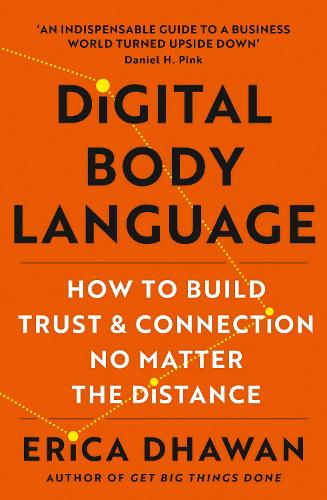
The definitive guide to communicating and connecting in a hybrid world.
Email replies that show up a week later. Video chats full of “oops sorry no you go” and “can you hear me?!” Ambiguous text-messages. Weird punctuation you can’t make heads or tails of. Is it any wonder communication takes us so much time and effort to figure out? How did we lose our innate capacity to understand each other?
Humans rely on body language to connect and build trust, but with most of our communication happening from behind a screen, traditional body language signals are no longer visible -- or are they? In Digital Body Language, Erica Dhawan, a go-to thought leader on collaboration and a passionate communication junkie, combines cutting edge research with engaging storytelling to decode the new signals and cues that have replaced traditional body language across genders, generations, and culture. In real life, we lean in, uncross our arms, smile, nod and make eye contact to show we listen and care. Online, reading carefully is the new listening. Writing clearly is the new empathy. And a phone or video call is worth a thousand emails.
Digital Body Language will turn your daily misunderstandings into a set of collectively understood laws that foster connection, no matter the distance. Dhawan investigates a wide array of exchanges—from large conferences and video meetings to daily emails, texts, IMs, and conference calls—and offers insights and solutions to build trust and clarity to anyone in our ever changing world.
Buy it:
Printed: Bookshop.org | Hive
eBook: Kindle | Kobo | eBooks.com
Audiobook: Audible | Kobo
(All links are unaffiliated.)
A World Without Email: Reimagining Work in an Age of Communication Overload
by Cal Newport
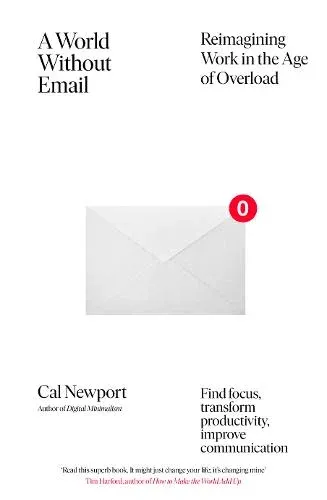
* New York Times Bestseller *
Feel like you're always drowning in email? How much more would you achieve without them - and how much happier would you be?
Emails are an integral part of work today. But the 'kind regards', forwards and attachments we check every 5.4 minutes are making us unproductive, stressed and costing businesses millions in untapped potential.
Bestselling author of Deep Work and Digital Minimalism, Cal Newport, is here to offer a radical new vision - a world without email. Drawing on sociology, behavioural economics and fascinating case studies of thriving email-free companies, Newport explains how this modern tool doesn't work for our ancient brains and provides solutions you can implement today to transform your workday into one without constant, distracting pings.
Revolutionary and practical, A World Without Email will liberate you to do your most profound, fulfilling and creative work — and be happier, too.
Buy it:
Printed: Bookshop.org | Hive
eBook: Kindle | Kobo | eBooks.com
Audiobook: Audible | Kobo
(All links are unaffiliated.)
